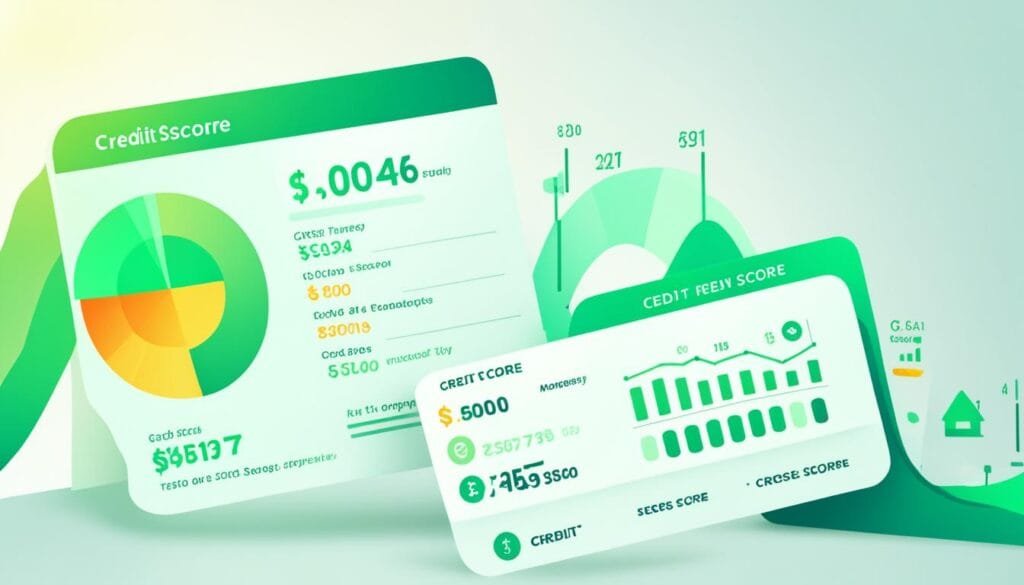Renting a home, apartment, or townhouse can have an impact on your credit in several ways. Positive rental history is increasingly being included in credit reports by credit reporting agencies. However, not all landlords report rental payment data to the credit bureaus. While having good credit can help you rent an apartment, paying rent on time may also help you build good credit. On the other hand, if you don’t pay your rent on time, it is becoming more common for that to be reported to the credit bureaus. It’s important to understand how renting can impact your credit and vice versa.
Key Takeaways:
- Your credit score can affect your ability to rent an apartment.
- Paying rent on time can help build a good credit history.
- Not all landlords report rental payment data to credit bureaus.
- If you don’t pay rent on time, it may be reported to the credit bureaus.
- Understanding how renting impacts your credit is important for financial planning.
How Rent Payments are Reflected in Credit Reports
Rent payments can play a significant role in your credit reports, but it ultimately depends on whether your landlord reports your rental history to the credit bureau. It’s important to note that not all landlords or property managers report this data, so it’s essential to understand how your credit reports include rental payment history.
If your landlord reports rental payments to the credit bureau, it can have a positive impact on your credit score and demonstrate your ability to pay bills on time. This can be advantageous when applying for rental properties as it showcases your financial responsibility to potential creditors.
However, it’s worth mentioning that some credit reporting agencies receive rent payment data from third-party services that charge a fee. So even if your landlord doesn’t directly report the information, it’s possible for it to appear on your credit report through these alternative channels.
The Importance of Rental Payment History
Reporting rental payment history to credit bureaus has become increasingly common and is seen as a valuable indicator of an individual’s financial responsibility. Timely rent payments can demonstrate your ability to manage financial obligations, which can positively affect your creditworthiness.
However, it’s crucial to note that not all credit scoring models consider rent payments in their calculations. While rental payment history can be beneficial, other factors such as credit card payments, loan repayments, and other debts also contribute to your credit score.
To better understand the impact of rent payments on your credit, it’s wise to monitor your credit reports regularly and ensure the information is accurate. You can access a free copy of your credit report once a year from each of the three major credit bureaus: Equifax, Experian, and TransUnion.
The Role of Credit Scores in the Rental Process
When applying for a rental, one of the key factors that landlords often consider is the applicant’s credit score. While there is no specific credit score requirement to rent an apartment, having a higher credit score can give you an advantage, especially in competitive rental markets.
Landlords take into account an applicant’s overall credit history, including payment history and any negative marks such as delinquencies, bankruptcies, or foreclosures. This information helps them assess an individual’s financial responsibility and ability to make rent payments on time.
Along with credit score, landlords may also consider factors like income and employment history during the tenant screening process. These additional factors can provide insights into your financial stability and ability to meet your rental obligations.
It’s important to be aware of your credit score and work on improving it if necessary. A higher credit score can increase your chances of being approved for a rental and may even give you leverage when negotiating lease terms.
By actively managing your credit, paying bills on time, and reducing debt, you can improve your credit score over time. This not only benefits you during the rental process but also helps establish a solid financial foundation for future endeavors.
Factors Considered in the Rental Process
| Factors | Importance |
|---|---|
| Credit Score | High |
| Payment History | High |
| Negative Marks (Delinquencies, Bankruptcies, etc.) | Medium |
| Income | Medium |
| Employment History | Medium |
Improving your credit score not only increases your chances of being approved for a rental but also opens up opportunities for better rental options in desirable locations. It’s essential to be proactive and take steps to improve your credit score to maximize your housing choices.
Developing good credit habits, such as paying bills on time, reducing debt, and keeping credit utilization low, can go a long way in boosting your credit score. It’s also helpful to regularly monitor your credit reports and address any errors or discrepancies promptly.
Remember, having a strong credit score isn’t just beneficial for renting but also for future financial endeavors like applying for loans, obtaining favorable interest rates, and even potential employment opportunities.

Having a thorough understanding of how credit scores impact the rental process can help you navigate the application process with confidence and increase your chances of securing your desired rental.
How to Improve Your Rental Application with Bad Credit
If you have bad credit or no credit history, it may be more challenging to find a landlord who will approve your rental application. However, there are steps you can take to improve your chances.
First, consider offering to pay an extra month or two of rent upfront or a higher security deposit to demonstrate your financial stability. This shows landlords that you are committed to meeting your financial obligations.
Another option is to provide a cosigner or guarantor with good credit. This person will be held responsible for the rent payments if you are unable to pay, giving landlords more confidence in your ability to fulfill your lease agreement.
It’s important to be honest about your credit or rent problems and provide explanations or references that showcase your efforts to improve your situation. For example, you could include a letter of explanation outlining any extenuating circumstances that led to your credit issues and detailing the steps you have taken to address them.
Here’s an example of how you can structure your letter of explanation:
Dear [Landlord’s Name],
I hope this letter finds you well. I am writing to provide additional information regarding my rental application. While my credit history may not be perfect, I want to assure you that I am taking proactive steps to improve my credit and financial situation.
Several years ago, I experienced unexpected medical expenses that resulted in financial hardship. Since then, I have taken the following measures to rectify the situation:
- Developed a strict budget to ensure timely payment of my obligations.
- Enrolled in a credit counseling program to learn effective money management strategies.
- Consistently paid all my current bills and rent on time.
I understand the importance of being a responsible tenant, and I am committed to meeting all my financial obligations. I have enclosed several letters of reference from current and previous landlords who can attest to my reliability and good character.
Thank you for considering my application, and I hope to have the opportunity to rent your property. I am happy to provide any additional information or documentation that might assist in your decision-making process.
Sincerely,
[Your Name]
By taking these steps and providing necessary documentation, you can improve your rental application and increase your chances of securing a lease, even with bad credit or no credit history.
Remember, honesty and transparency are key. Demonstrate your commitment to improving your financial situation and showcase your positive rental history and references.
Improving your credit score takes time, so be patient and proactive in your efforts. With diligence and persistence, you can enhance your creditworthiness and position yourself for future rental success.
Nowadays, many people rely on their credit scores to secure rental properties, as landlords often use credit reports and credit scores to assess tenants’ financial responsibility and ability to pay rent on time.
| Steps to Improve Your Rental Application with Bad Credit |
|---|
| Offer to pay additional rent upfront or a higher security deposit. |
| Provide a cosigner or guarantor with good credit. |
| Be honest about your credit or rent problems and provide explanations or references. |
| Include a letter of explanation outlining extenuating circumstances and steps taken to address credit issues. |

The Impact of Credit Checks on Rental Applications
When applying to rent an apartment, landlords often require a credit check as part of the application process. Giving landlords permission to pull your credit report initiates a credit inquiry, which can have a temporary impact on your credit score. While a single credit inquiry may not significantly affect your score, multiple inquiries within a short period can lower it.
Landlords review various factors in addition to your credit report and score to assess your ability to pay rent on time. These factors may include rental history, employment verification, and other relevant information. Understanding how these credit checks work can help you navigate the rental application process more effectively.
If your rental application is declined due to information in your credit report, you have the right to request a free copy of the report. Obtaining a copy will allow you to review the details and address any errors or discrepancies that might have affected your application.
Effects of Credit Inquiries on Credit Score
Credit inquiries can have a temporary impact on your credit score. Inquiries fall into two categories: hard inquiries and soft inquiries.
A hard inquiry occurs when a lender or creditor pulls your credit report in response to a credit application. These inquiries can result from applying for credit cards, loans, or, in this case, a rental application. Hard inquiries can lower your credit score by a few points, and they remain on your credit report for up to two years.
A soft inquiry, on the other hand, occurs when you check your own credit report, or when a company, such as an employer or a promotional offer, checks your credit without your consent. Soft inquiries do not impact your credit score. Landlords typically perform hard inquiries when reviewing rental applications.
Requesting and Reviewing Your Credit Report
As a consumer, you have the right to request a free copy of your credit report if you are denied a rental application based on the information in your report. Reviewing your report will allow you to verify the accuracy of the information and identify any potential issues that may be affecting your creditworthiness.
You can request a free copy of your credit report from each of the three major credit reporting agencies: Equifax, Experian, and TransUnion. Be sure to review the reports from all three agencies, as the information may vary.
When reviewing your credit report, pay attention to the following:
- Accuracy of personal information: Confirm that your name, address, and other identifying information are correctly listed.
- Account details: Check that your credit accounts, loans, and payment history are accurately reflected.
- Public records: Look for bankruptcies, tax liens, or other negative public records that may be impacting your credit.
- Credit inquiries: Verify that the inquiries listed on your report are legitimate and authorized by you.
If you find any errors or discrepancies on your credit report, you should dispute them with the respective credit reporting agency. Correcting inaccuracies can help improve your creditworthiness and increase your chances of future rental approvals.
Understanding Your Rights
In the United States, the Fair Credit Reporting Act (FCRA) protects your rights as a consumer when it comes to credit reporting. The FCRA requires credit reporting agencies to provide accurate and fair information, and it gives you the right to dispute inaccuracies on your credit report.
Under the FCRA, you have the right to request a free copy of your credit report if you are denied a rental application based on the information in your report.
By understanding your rights, you can take steps to protect your creditworthiness and ensure accuracy in your credit reports.
Comparison of Hard and Soft Credit Inquiries
| Category | Hard Inquiries | Soft Inquiries |
|---|---|---|
| Description | Credit checks resulting from credit applications | Checks not related to credit applications (e.g., personal credit checks) |
| Impact on Credit Score | Can lower credit score by a few points | No impact on credit score |
| Duration on Credit Report | Up to 2 years | Not included on credit report |
Strategies for Renting with No Credit History
Renting with no credit history can be challenging, especially when landlords rely on credit scores for rental approval. However, there are strategies you can employ to increase your chances of being approved for a rental, even without a credit history.
1. Provide a Cosigner or Roommate: Including a cosigner or roommate with a good credit history can reassure landlords about your ability to fulfill your rental obligations.
2. Offer Proof of Financial Stability: Providing recent pay stubs or bank statements can demonstrate your current financial stability, helping landlords feel more confident in your ability to pay rent on time.
3. Provide Rental References: If you’ve previously rented a property, ask your previous landlords for references. Positive rental references can vouch for your reliability as a tenant.
4. Build Your Credit: If time allows, work on building your credit before applying for a rental. Consider obtaining a secured credit card or credit builder loans to establish a credit history.
5. Explore No-Credit-Check Apartments: Some apartments or private landlords may not require a credit check or have less stringent approval requirements. Research these options to widen your selection of potential rentals.
6. Focus on Private Landlords: Private landlords may have more flexibility in their rental criteria compared to larger property management companies. Connect with private landlords and explain your situation to find a rental opportunity that suits your needs.
Implementing these strategies can help you overcome the challenges of renting with no credit history. By demonstrating financial stability, providing references, and exploring alternative options, you can increase your chances of finding a suitable rental property.
How Lease Agreements Impact Credit Reports
Lease agreements themselves do not typically appear on credit reports unless specific actions are taken. To have your lease and rent payments reported to the credit bureaus, you can use a third-party rent reporting service or ask your landlord to do so. Not all landlords report rent payment data, and it’s important to understand if your lease agreements are impacting your credit. Making on-time rent payments is crucial, as late payments can negatively affect your credit score if reported.
The Importance of Reporting Lease Agreements
While lease agreements are not automatically reported to credit bureaus, it can be advantageous to have your rental payment history reflected in your credit report. When rental payments are reported, they serve as an additional positive credit reference and can help establish or improve your credit score. This information can be particularly useful if you have limited credit history or are working to rebuild your credit.
Using third-party rent reporting services can be a valuable tool for tenants to build credit history while paying rent on time, adding another layer of financial responsibility.
How to Have Your Lease Agreements Reported
If you want your lease agreements and rent payments to appear on your credit report, there are a few steps you can take:
- Check if your landlord or property management company offers rent reporting services. Some landlords may already have established partnerships with credit bureaus to report rental payment data.
- Ask your landlord if they would be willing to report your rental payment history. While not all landlords may be open to this, it never hurts to ask and explain your intentions to build credit.
- Consider using a third-party rent reporting service. These services act as intermediaries between tenants and credit bureaus, facilitating the reporting of rental payments to their respective databases. Research reputable rent reporting services and choose one that aligns with your needs and budget.
The Impact of On-Time Payments
Making on-time rent payments is essential, as late or missed payments can result in negative marks on your credit report. These negative marks can lower your credit score and make it more difficult to secure future rental agreements or obtain credit for other purposes. By consistently paying your rent on time, you demonstrate financial responsibility and improve your creditworthiness.
| Positive Impact of On-Time Payments | Negative Impact of Late Payments |
|---|---|
| Builds positive credit history | Lowers your credit score |
| Increases your creditworthiness | Makes it harder to rent in the future |
| Creates a favorable impression for future creditors | May result in financial penalties or eviction |
By prioritizing on-time rental payments and ensuring they are reported to the credit bureaus, you can improve your credit score and enhance your chances of securing future rental agreements or obtaining credit for other purposes.
Having a positive credit score is essential when it comes to renting. It not only demonstrates your financial responsibility but also increases your chances of being approved for a rental. By understanding how lease agreements impact credit reports and taking proactive steps to improve your credit, you can pave the way for a smooth rental process and secure your desired home.
How Does Credit Score Affect Renting Apartments and Rent-to-Own Options?
When renting apartments or considering rent-to-own options, having a smart credit score is crucial. Landlords and property managers use credit scores to assess a tenant’s financial responsibility and ability to make timely rent payments. By following smart credit score advice, individuals can increase their chances of securing their desired rental property.
Conclusion
Your credit score plays a significant role in your ability to rent an apartment. Landlords often rely on credit reports and credit scores to evaluate a potential tenant’s financial responsibility and their likelihood of paying rent on time. While there isn’t a specific credit score requirement for renting, having a good credit score can increase your chances of being approved for a lease.
It’s crucial to understand how your rental payments can be reflected in your credit reports and take steps to improve your credit if needed. Positive rental history can be beneficial, but it’s important to note that not all landlords report rental payment data to credit bureaus. Paying your rent on time not only helps you maintain a good rental history but can also contribute to building a positive credit score.
Being proactive and transparent about your credit history is key to securing your next lease with confidence. Consider checking your credit reports regularly to ensure accuracy and address any discrepancies. If your credit score needs improvement, focus on strategies to boost your score, such as paying bills on time, reducing credit card debt, and managing your finances responsibly.
Remember, while credit score is a significant factor, it’s not the only consideration for landlords. They may also review your overall credit history, rental history, income, and other factors during the screening process. By understanding the impact of credit scores on renting and taking steps to improve your credit, you can increase your chances of finding a suitable rental and securing it successfully.
FAQ
How does renting an apartment affect my credit score?
Renting an apartment can impact your credit score in several ways. Positive rental history may be reported by some landlords to credit reporting agencies, helping to build good credit. However, not all landlords report rental payment data. Additionally, late or missed rent payments can be reported to credit bureaus, potentially lowering your credit score.
Do all credit reports include rental payment history?
Not all credit reports include rental payment history. While some credit reporting agencies receive rent payment data from third-party services, not all credit scoring models consider rent payments in their calculations. It’s important to know if your credit reports include rental payment history.
What role does a credit score play in the rental process?
Landlords often check potential tenants’ credit reports and credit scores before approving a rental application. While there is no specific credit score requirement to rent an apartment, having a higher credit score can give you an advantage, especially in competitive rental markets. Landlords consider an applicant’s overall credit history, including payment history and any negative marks such as delinquencies or bankruptcies.
How can I improve my rental application if I have bad credit?
If you have bad credit, there are steps you can take to improve your chances of being approved. Consider offering to pay an extra month or two of rent upfront or a higher security deposit to demonstrate your financial stability. Providing a cosigner or guarantor with good credit can also help. Be honest about your credit or rent problems and provide explanations or references that showcase your efforts to improve your situation.
Can credit checks for rental applications affect my credit score?
When a landlord pulls your credit report as part of the rental application process, it initiates a credit inquiry, which can temporarily affect your credit score. While a single inquiry may not have a significant impact, multiple inquiries within a short period can lower your score. It’s important to be aware of how credit checks can impact your credit.
How can I rent with no credit history?
Renting with no credit history can be challenging, but there are options available. Providing a cosigner or roommate with good credit can increase your chances of being approved. Offering proof of financial stability, such as recent pay stubs, and providing rental references can also help. Building credit before applying for a rental through strategies like obtaining a secured credit card or credit builder loans can improve your chances.
Do lease agreements appear on credit reports?
Lease agreements themselves do not typically appear on credit reports unless specific actions are taken. To have your lease and rent payments reported to credit bureaus, you can use a third-party rent reporting service or ask your landlord to do so. Not all landlords report rent payment data, so it’s important to understand if your lease agreements are impacting your credit.
What is the impact of credit scores on renting an apartment?
Your credit score can impact your ability to rent an apartment. Landlords often use credit reports and credit scores to assess potential tenants’ financial responsibility and ability to pay rent on time. While there is no specific credit score requirement to rent, having a good credit score can increase your chances of approval. It’s important to understand how rental payments can be reflected in credit reports and take steps to improve your credit if necessary.

